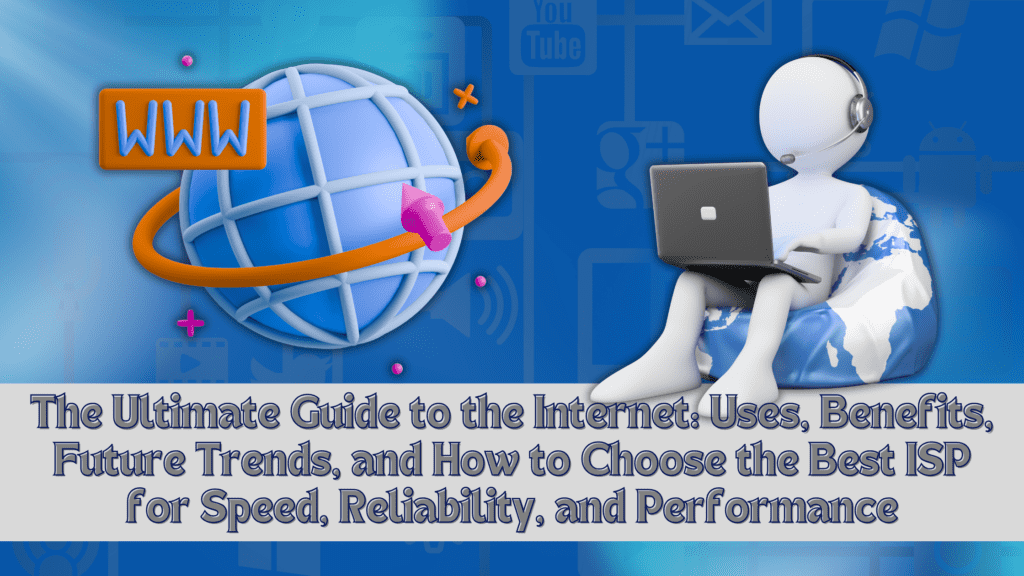 The internet has become an indispensable part of modern life, serving as the backbone for communication, entertainment, education, and business. Understanding the various internet service providers (ISPs), their offerings, and how they impact activities like gaming is crucial for consumers seeking the best online experience. This comprehensive guide delves into the features, scope, and performance of leading ISPs, including Spectrum Internet, Internet Archive, T-Mobile Home Internet, Frontier Internet, Xfinity Internet, AT&T Internet, and Starlink Internet.
The internet has become an indispensable part of modern life, serving as the backbone for communication, entertainment, education, and business. Understanding the various internet service providers (ISPs), their offerings, and how they impact activities like gaming is crucial for consumers seeking the best online experience. This comprehensive guide delves into the features, scope, and performance of leading ISPs, including Spectrum Internet, Internet Archive, T-Mobile Home Internet, Frontier Internet, Xfinity Internet, AT&T Internet, and Starlink Internet.
What is the Internet?
The internet is a global network that connects millions of computers, allowing users to share information, communicate, and access a vast range of services. It has expanded into various domains, including education, healthcare, business, gaming, and entertainment.
Uses of the Internet
-
Communication – Email, social media, and video conferencing enable real-time interactions.
-
Education – Online learning platforms provide access to courses and resources.
-
Business – E-commerce, digital marketing, and remote work have transformed industries.
-
Entertainment – Streaming services, gaming, and social media offer endless entertainment options.
-
Research & Information – Websites like Internet Archive help preserve digital content for reference.
-
Banking & Transactions – Online banking and digital wallets make financial transactions seamless.
-
Health & Telemedicine – Remote healthcare services improve accessibility to medical professionals.
Scope of the Internet
The internet continues to evolve with advancements such as 5G, fiber optics, and satellite connectivity. Innovations like Starlink Internet have expanded internet access to remote locations, while Spectrum Internet, T-Mobile Home Internet, and Frontier Internet focus on delivering high-speed broadband to urban and suburban areas.
Features of a Good Internet Service
-
High Speed – Essential for streaming, gaming, and working efficiently.
-
Reliability – Uninterrupted connection without frequent outages.
-
Low Latency – Crucial for gaming and video conferencing.
-
Affordable Pricing – Different plans cater to various budget ranges.
-
Security – Protection against cyber threats.
-
Multiple Device Support – Enables seamless connection across gadgets.
Internet Service Providers (ISP)
1. Spectrum Internet
Spectrum Internet, offered by Charter Communications, is renowned for delivering high-speed broadband services across the United States. With a focus on reliability and performance, Spectrum caters to both residential and business customers.
Features and Services
-
High-Speed Internet: Spectrum provides various plans with speeds starting from 200 Mbps, suitable for standard browsing and streaming, up to 1 Gbps for heavy internet users and large households.
-
No Data Caps: Unlike some competitors, Spectrum offers unlimited data usage, ensuring customers can stream, download, and game without worrying about overage charges.
-
Bundled Services: Customers have the option to bundle internet with TV and phone services, often at discounted rates, providing a comprehensive communication solution.
Speed in Gaming
For gamers, a stable and fast internet connection is vital. Spectrum’s high-speed plans, especially those offering 1 Gbps, are ideal for online gaming, reducing latency and ensuring smooth gameplay. The absence of data caps is particularly beneficial for downloading large game files and updates.
2. Internet Archive
While not an ISP, Internet Archive is a pivotal resource in the digital world. Established in 1996, it is a non-profit organization dedicated to preserving digital content, including websites, books, audio recordings, and videos.
Uses and Scope
-
Wayback Machine: Allows users to access archived versions of web pages, providing a historical snapshot of the internet.
-
Digital Libraries: Hosts millions of free books, movies, software, music, and more, supporting education and research.
-
Data Preservation: Ensures the longevity of digital content, safeguarding it against loss or obsolescence.
The Internet Archive serves as a crucial tool for researchers, historians, and the general public, offering access to a vast repository of digital information.
3. T-Mobile Home Internet
T-Mobile, traditionally known for its mobile services, has ventured into the home internet market, leveraging its extensive 5G network to offer wireless home internet solutions.
Features and Services
-
5G Connectivity: Utilizes T-Mobile’s 5G network to deliver internet services, offering speeds comparable to traditional broadband.
-
Simple Setup: Provides a plug-and-play router, eliminating the need for complex installations.
-
No Contracts: Offers flexibility with no long-term commitments, allowing customers to cancel anytime without penalties.
Speed in Gaming
While T-Mobile’s 5G Home Internet can provide sufficient speeds for casual gaming, some users have reported inconsistencies in performance. Factors such as network congestion and signal strength can impact latency and download speeds, which are critical for a seamless gaming experience. Prospective customers should assess local 5G coverage and consider potential fluctuations in performance.
4. Frontier Internet
Frontier Communications offers both DSL and fiber-optic internet services, with availability varying by region. The company has been expanding its fiber network to provide faster and more reliable internet options.
Features and Services
-
Fiber-Optic Internet: Frontier’s fiber plans offer symmetrical speeds, with options ranging from 500 Mbps to 5 Gbps, catering to various user needs.
-
No Data Caps: All plans come with unlimited data, allowing unrestricted internet usage.
-
No Contracts: Most plans do not require long-term commitments, providing flexibility to customers.
Speed in Gaming
Frontier’s fiber-optic plans are well-suited for gaming, offering high speeds and low latency. The symmetrical upload and download speeds ensure smooth online gameplay and quick game downloads. However, the performance of DSL services may vary depending on the region and infrastructure quality.
5. Xfinity Internet
Xfinity, a brand of Comcast, is one of the largest ISPs in the United States, offering a range of internet plans to accommodate different user requirements.
Features and Services
-
Diverse Plans: Offers a variety of speed tiers, from basic plans suitable for light browsing to gigabit plans for heavy internet users.
-
xFi Gateway: Provides an advanced modem-router combo with features like parental controls and cybersecurity protection.
-
Bundling Options: Customers can bundle internet with TV, phone, and home security services for integrated solutions.
Speed in Gaming
Xfinity’s higher-tier plans are designed to support gaming, streaming, and other high-bandwidth activities. The company has been introducing ultra-low latency technologies to enhance the gaming experience, aiming to reduce delays and improve responsiveness. This advancement is particularly beneficial for real-time gaming applications.
Conclusion
Choosing the right internet provider depends on individual needs, whether for gaming, streaming, business, or general browsing. Spectrum Internet, T-Mobile Home Internet, Frontier Internet, Xfinity Internet, AT&T Internet, and Starlink Internet each offer unique features catering to different requirements. The future of the internet looks promising with advancements in fiber, 5G, and satellite technology, ensuring greater accessibility and improved performance for users worldwide.


